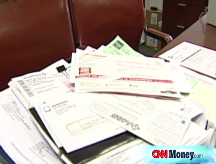Car dealers face the grim reaper
The credit crisis is slamming sales and sending operating costs for already strained auto dealers through the roof.
 |
| Clinton, Iowa, auto dealer John McEleney says business is still good in the Midwest. |
NEW YORK (CNNMoney.com) -- If you want to see how America's credit crisis is hitting the streets of your hometown, go to your local car dealer. Auto dealers depend on credit. They need it to run their stores and their customers need it to buy their products. From every angle, credit trouble hurts.
"I'm talking to dealers every day who are just hanging on," said Denny Fitzpatrick, Chairman of the California New Car Dealers Association and owner of Fitzpatrick Chevrolet Hummer in Concord, Calif.
In a typical growth year, America loses 75 to 150 dealerships, so some contraction is normal even in the best of times, said Paul Taylor. an economist with the National Automobile Dealers Association. But this year, there could be 500 to 700 fewer auto dealerships by the end of the year, he said . (See correction.)
High gas prices that have turned buyers away from large trucks and SUVs - and all but obliterated Hummer sales - have hurt his business, but Fitzpatrick thinks tight credit is doing even more damage.
"We're seeing people with Beacon scores that are pretty darned good," Fitzpatrick said, "and the finance companies are just looking for reasons to turn them down."
Not every car dealer sees the situation as that dire. John McEleney, president of McEleney Autocenter in Clinton, Iowa and vice chairman of the National Automobile Dealers Association, says he understands that things are hard, but his business is holding up fairly well.
McEleney owns several dealerships and sells several General Motors brands as well as Hyundai and Toyota cars and trucks.
"Probably the most direct effect for me has been availability of retail financing for my customers," said McEleney.
So far his customers can still get auto loans, McEleney said, but they may need a bigger down payment.
"I wouldn't say it's that dramatic, yet," he said.
Fortunately for him, McEleney said, Iowa didn't experience the run-up in home prices other parts of the nation did, including California. That's means it hasn't experienced the home equity crash, either.
In most of the country, the collapse of the housing market has left consumers without the low-cost home equity loans that drove car sales in recent years. Also, the drain of home equity has left potential customers feeling poor, said NADA economist Paul Taylor. That, as much as the actual loss of low-interest credit, has hurt car sales.
With sales down, auto dealers who carry large inventories are experiencing their own credit squeeze.
"The cost of doing business is going up," said Mike Jackson, chief executive of AutoNation, the country's largest car dealership chain. "Especially on floorplanning with domestics."
"Floorplanning" is the line of credit dealers use to pay for their inventory. Domestic-brand auto dealers who carry large inventories will be among the first to die, Jackson predicts.
Floorplan loans become burdensome the longer cars go unsold. For the first three months a car is in inventory, interest on the floorplan loan is usually reimbursed by the manufacturer. Later, if a vehicle is still there after about six months, finance companies can start demanding payment on the principal on the loan.
As credit markets have tightened, GMAC and Chrysler Credit have raised interest rates and what are called "curtailment" costs, the cost of having vehicles in inventory for a long time, according to reports in the industry newspaper Automotive News. (GMAC and Chrysler credit would not confirm those reports.)
"When you're scrambling with cash flow like this, it's 'How are we going to pay these costs?'" said California dealer Fitzpatrick, who finances his inventory through GMAC.
Many dealers have learned to operate with leaner inventories, said Iowa's McEleney.
"When a dealer is called upon to pay down $100,000 to $200,000 in inventory they have to look to other outlets," said McEleney. Those other "other outlets," other credit sources to draw from to pay curtailment costs, are no longer easily accessible, he said.
Finance companies have an incentive not to squeeze high-performing dealers too hard, McEleney said. Pushing away a good car dealer means driving away a lot of potential consumer auto loans.
"Historically, that's been a very desirable piece of business from a lender's standpoint," he said.
That gives big, multi-store dealers more bargaining clout with lenders, said NADA economist Taylor. For example, Asbury Automotive, a large national dealer chain, recently announced that it had locked in a line of credit with several banks. Smaller dealers can't do that and their interest rates have been fluctuating widely, said Taylor.
Squeezing dealers on curtailment costs can be a way for manufactures and their affiliated auto finance companies to weed out dealers they see as underperforming, Fitzpatrick said. GMAC has been scrutinizing his dealership's finances more closely, he said. (GMAC could not immediately comment on Fitzpatrick's complaints. A spokewoman for General Motors said GM plays no role in floorplan financing.)
"The big question is 'Who's going to be left standing?" he said.
Correction: An early version of this story said that the industry typically adds dealers during a typical growth year. It does not. The story has also been updated to include a higher estimate for expected dealership closings this year. (Back to story.) ![]()


